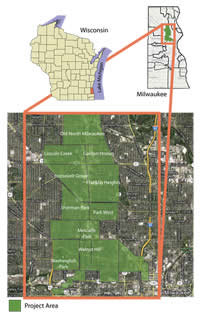Region 5 EJ Showcase Community: Milwaukee, WI 30th Street Corridor
Grants & Programs Topics
EJ Showcase Communities by Region
Overview
EPA Region 5 is working to further the redevelopment of the 30th Street Industrial Corridor. The corridor, a former rail line in the north-central part of the city, is home to low income, communities of color. This project seeks to improve the human, environmental and economic health of these neighborhoods by redeveloping Brownfields along the corridor, implementing environmentally preferable stormwater management practices, and developing urban agriculture.
Successes
- Used geographic-based targeted enforcement to assess facilities in the EJ community.
- Conducted 25 tank and facility inspections and 7 multi-media investigations to assess potential impacts on the communities.
- Supported revitalization with $1.3 million to the City and 4 brownfields assessment grants, totaling $800,000, to the State to assess and remediate 200 known sites.
- Reached over 100 local families with training on blood lead screening, asthma testing, lead paint removal and healthy home practices.
- Provided training to over 170 community health workers (CHWs) and healthcare providers.
- Conducted hazard training in 90 public schools and removed 100 pounds of hazardous chemicals.
- Provided lead abatement training to 63 contractors and handymen.
History

Milwaukee is facing and overcoming an aggregation of problems from its industrial past and declining manufacturing base: brownfields sites, old housing stock, loss of jobs, high unemployment, vacant lots, low educational attainment, and high asthma rates and high blood lead levels in children. The brownfields properties threaten public health, the environment, and neighborhood communities in a number of ways including contaminants in the soil, air and water, as well as rodent infestations, trash dumping, and unsafe buildings. Region 5, in partnership with the City of Milwaukee, Wisconsin Department of Natural Resources, Public Health Agencies and organizations, non-governmental organizations (NGOs), and neighborhood organizations are implementing a range of projects to address the public health concerns through education, health care worker training, and healthy home intervention; to reduce environmental issues through targeted enforcement actions, inspections, and cleanups; and to engage the neighborhoods in conversation and collaboration.
Fight Asthma Milwaukee and Milwaukee Area Health Education Center (AHEC) partnered with Region 5 for asthma awareness training and Healthy Homes approaches to control and reduce indoor environmental asthma triggers. The training reached more than 50 community health workers, case managers, and other professionals involved with home visitation programs that are trusted by community residents.
Children’s health in low income and minority neighborhoods may be at risk from the conditions at home, in school and other sources. Region 5 participated in annual training in safe chemicals management for 46 head science teachers and Environmental Health and Safety staff from Milwaukee Public Schools (MPS). This training is part of an ongoing effort by MPS to improve their school environments and ensure the health and safety of students and staff. The participants, who serve as Chemical Hygiene Officers for their respective schools, learned principles of risk and children's health, laboratory safety, principles of safe chemical handling, and green chemistry. Additional training and technical assistance activities for reducing exposures to laboratory chemicals focuses on area charter and private schools.
Milwaukee is converting former brownfields property to urban gardens which are leased to organizations or neighborhood groups. An urban garden was constructed on a parcel of the former Esser facility in the Corridor as a result of a partnership between the City, State, EPA, and other institutions. On Earth Day 2010, it was dedicated as the Hmong American Friendship Garden, which will be managed and used by the Hmong community.
A partnership comprised of EPA Region 5, the Milwaukee Food Council, Center for Resilient Cities, Growing Power, the city of Milwaukee and the state of Wisconsin will explore how to connect the growing demand for urban gardens with public policies and improved access to healthy foods. More than 20 organizations are working together to form a roadmap for moving forward.
Because brownfields and vacant industrial facilities are obstacles to the revitalization partnership of Region 5, Milwaukee and the State have conducted brownfields assessments of over 50 properties, with more planned. Using Recovery Act-Leaking Underground Storage Tanks funding, they are removing tanks and cleaning up 17 projects in preparation for redevelopment. In the fall of 2010, the City welcomed the first business, Talgo, a Spanish train car manufacturer and employer with 80 new jobs, into a redeveloped parcel in the Corridor.
For more information or to become involved, please contact Marilou Martin (martin.marilou@epa.gov), 312-353-9660.
![[logo] US EPA](../gif/logo_epaseal.gif)